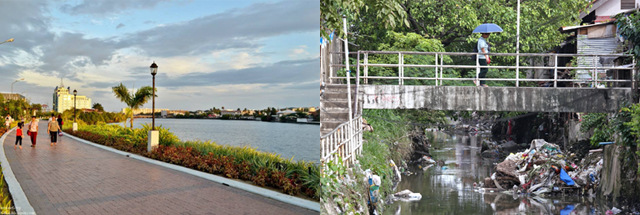Campaign to rescue Cebu’s 5 rivers needs people to ‘stop taking water for granted’

A breath of fresh air and a view of a clean Iloilo River greet visitors in the brick paths of the Esplanade in Iloilo, which opened in 2012. At the right, the Tejero bridge in Cebu City overlooks an estero that carries garbage tossed by urban dwellers. Cebu’s City’s five main rivers drain into the sea using creeks that get choked with waste and contribute to flooding.
With summer about to start, water bodies become the focus of new attention as a source of life, leisure – and sadly, garbage.
A campaign to raise awareness of the abused state of Cebu’s five rivers will be kicked off by the Movement for a Livable Cebu (MLC) and its partners on March 22, World Water Day.
“We want to reawaken the public’s conscience and give voice to the the rivers” said Jesse Baring, MLC’s pointman for the campaign.
“People just take water for granted.”
Signs with messages about the value of clean, flowing rivers will be put up in four bridges over esteros in the historic Parian district of Cebu City.
These bridges in Bonifacio Street, Zulueta Street, Tejero and D. Jakosalem Street traverse creeks used as garbage disposal sites by uncaring urban dwellers. The waste not only pollutes the waterway, it restricts the channel, contributing to flashfloods in the rainy season.
The campaign “Syagit sa Sapa” which means Cry of the the River in Cebuano starts with a morning bike ride to the bridges on March 22. Other activities, workshops and seminars will be held leading up to a multi-sectoral summit in April to discuss strategies to recover Cebu City’s rivers.
Louella Alix, MLC core group member, said the challenge for Cebu city to rescue its choked, trash-filled rivers was difficult but doable considering the success shown by Iloilo City in cleaning up the Iloilo River.
The 1.2 kilometer park along the Iloilo River, called the Esplanade, is now a favorite promenade site and tourism showcase.
“If Iloilo can do it, there’s no reason Cebu City can’t,” said Alix, who has written books on Cebu’s cultural heritage, churches and cuisine.
The Iloilo River played a pivotal role in the sugar trade in Negros island which prompted Spanish royalty to confer the title “Queen City of the South” over 100 years ago. Cebu City later adopted the title when economic activitiy was spurred by the Port of Cebu in 1917.
Cebu has five major rivers which run through the city — Guadalupe, which is the biggest, Lahug, Kinalumsan, Mahiga and Butuanon.
A study by the Japan International Cooperation Authority (JICA) which is preparing a Metro Cebu roadmap for sustainable urban development said flooding was a consequence of abuse of the rivers. The river’s natural capacity is supposed to be sufficient as drainage outlets for rain water .
“The existing rivers, creeks and drainages are not realizing their actual capacities due to clogging from garbage, deposited solids and informal settlements,” said JICA in its 3rd interim report released in February. It stressed the need for local governments to clean the waterways and dredge deposited solids.
“There are many flood prone areas in the metropolis although flooding happens when high tide and heavy rain occur at the same time,”it said.
It said river management is devolved to the local government but “the overall responsibility is not clearly delegated to a specific office.””
In 1995, JICA Study on Flood Control on Rivers in the Selected Urban Centers was conducted, which selected Cebu City as one of the target areas. The study carried out surveys on five rivers in Cebu City which pointed out that the key measure is to increase the flow capacity of rivers. However, no river improvement projects or flood control project were conducted so far. “”
Disclaimer: The comments uploaded on this site do not necessarily represent or reflect the views of management and owner of Cebudailynews. We reserve the right to exclude comments that we deem to be inconsistent with our editorial standards.
